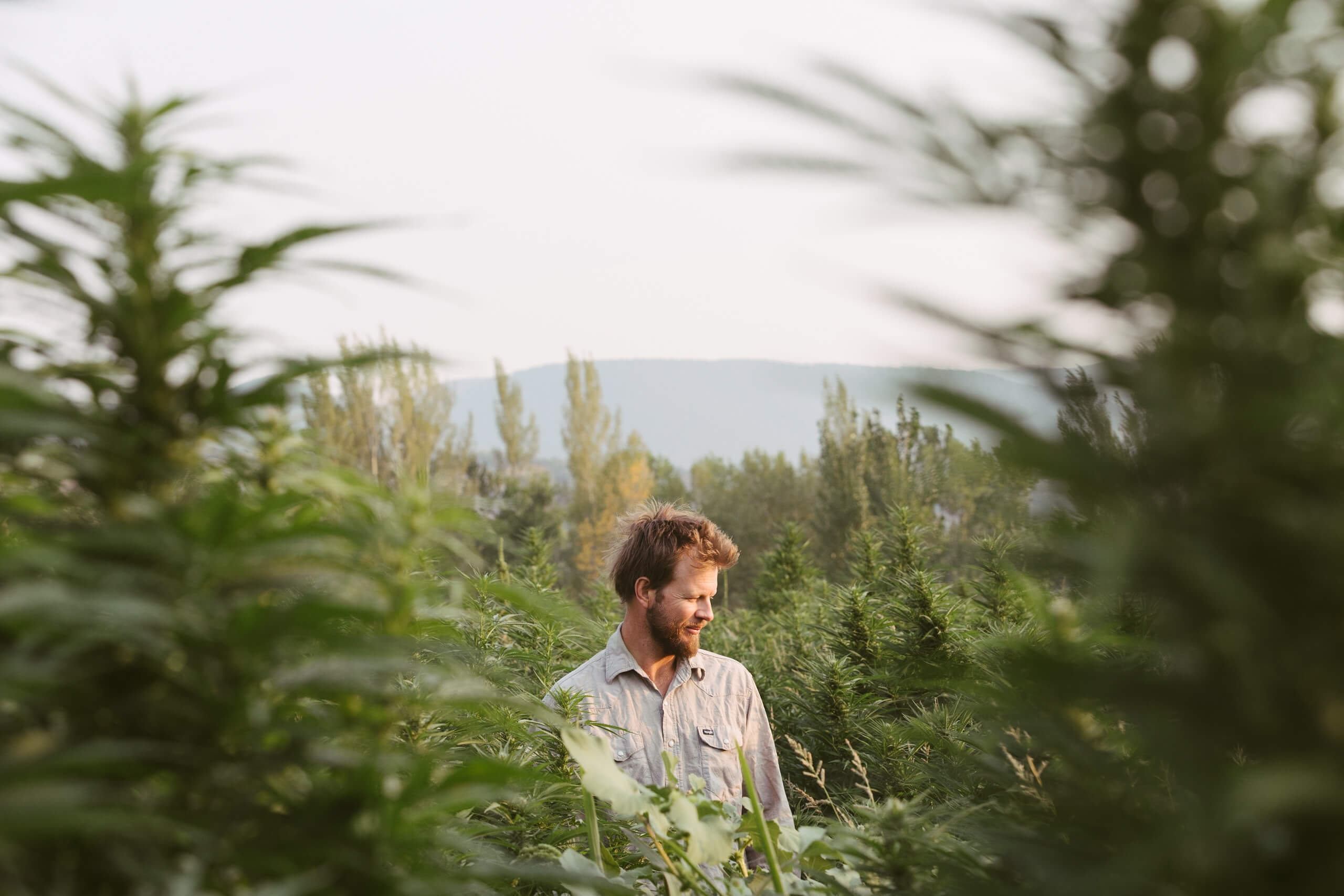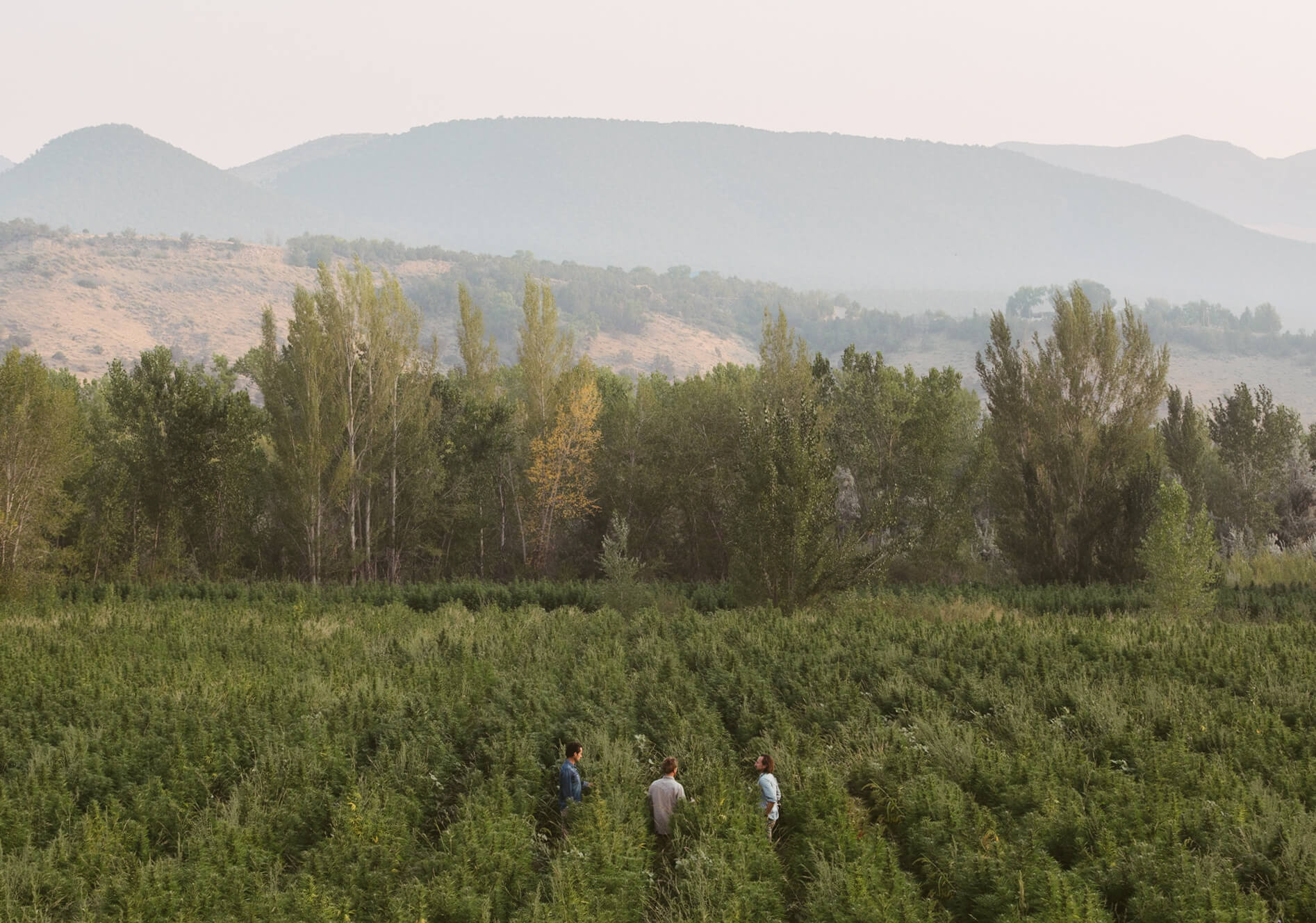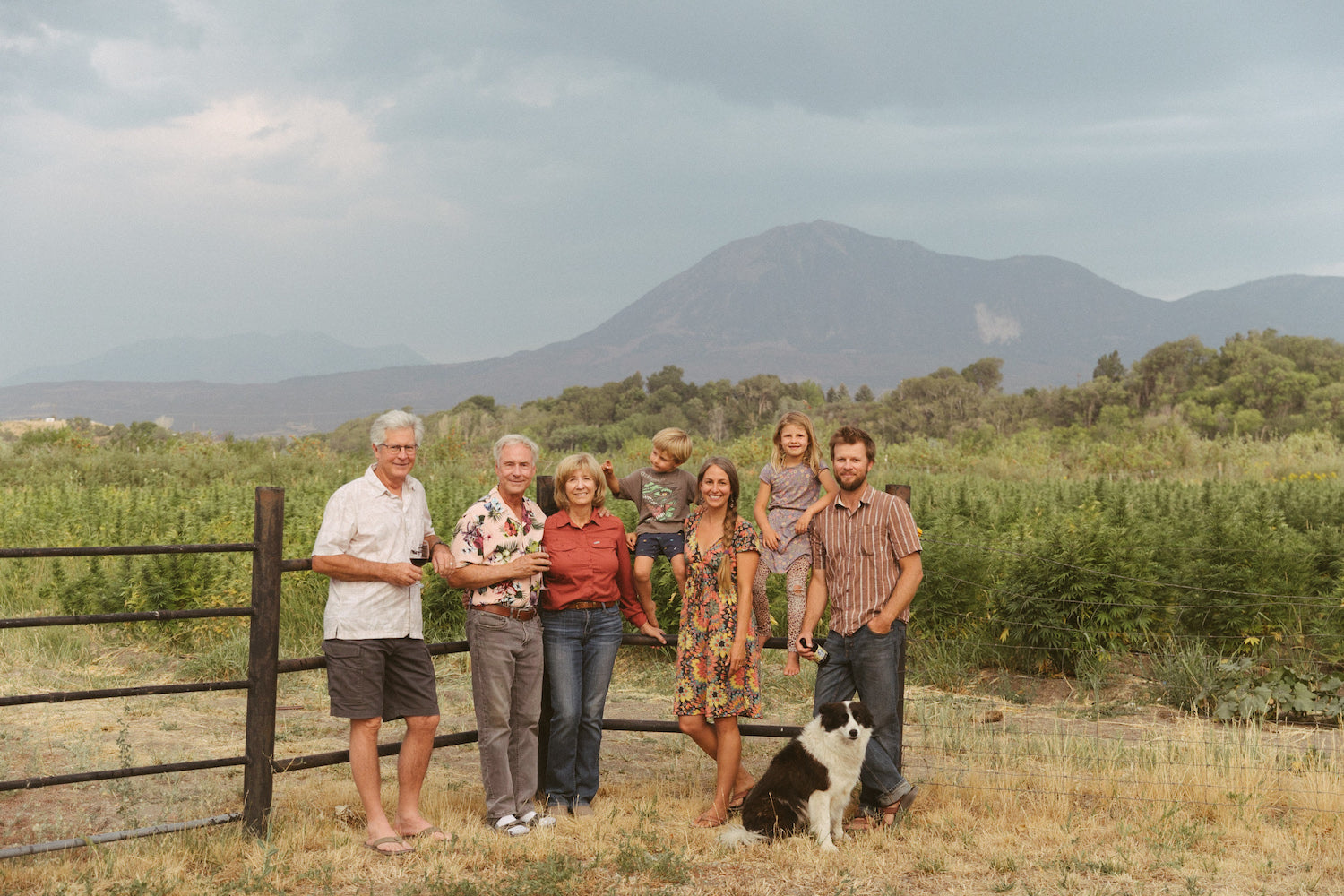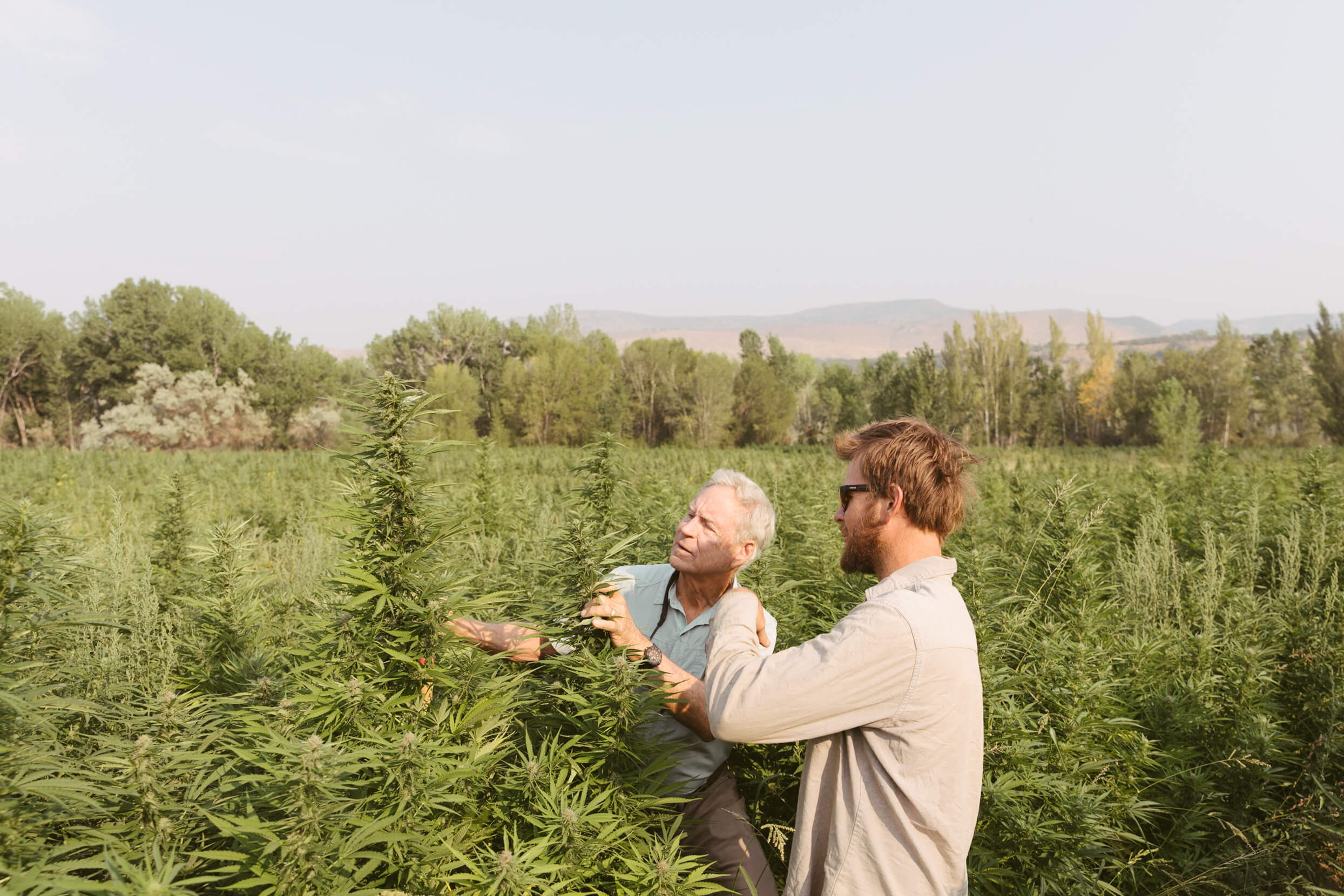Meet Jonathan, the humble farmer behind the world’s best USDA certified organic hemp — and the only farm we source from. When we say it’s slow crafted in small batches by extraordinary people, we mean it.
Ret: Let’s start from the beginning, from the seed . . .
Jonathan: Well, everything on our farm starts from seed, no clones here. Each of the varieties we use are feminized seeds. We choose to use seeds for several reasons. One of them is, there’s something called seed vigour, and it’s a real thing. It’s something you don’t generally see with clones. Seeds send a tapper down and from then on they just have a lot more vigour and grow faster than a lot of clone varieties out there. So, generally in the end, it means higher yield and bigger, healthier plants.

Ret: So the more natural it is, the healthier it is, and by extension the better it is for the farm, the better it is for the business — when you do it the natural way.
Jonathan: It is both more simple and more natural. Another of the main reasons I like to use seed is because each plant is its own plant, it's not a clone from a mother plant, so it’s not so much of a monoculture. We’re always striving for greater biodiversity on this organic farm of ours. To elaborate on that, if you have a whole field of clones from the same variety and something like a pest problem or a virus pops up, you’re going to have a harder time dealing with that then if each seed is its own plant, has its own traits, and even though its coming from the same genetics, it’s usually able to withstand pests and virus, drought, and all the other things Mother Nature throws at us farmers.
Ret: As you know, at Ned we’re all about doing everything in as simple and natural a way as possible. We took this approach to our business directly from nature. It’s always nice to see it play out in nature, and by and large the people and other businesses we work with understand the power behind this approach and have adapted it themselves.
Jonathan: Yeah, the whole idea is to observe nature and try to work with it, instead of against it.

Ret: Absolutely. We think we’re smarter than nature sometimes and we create GMOs and monoculture and meanwhile the tried and true method is to do it the way Mother Nature always has.
Jonathan: That’s right, that’s correct!
Ret: What are some of the things you do on your farm that are different from a lot of other hemp farms.
Jonathan: One thing we really focus on is plant health. That means paying close attention to the needs of the plants throughout the season and constantly adjusting our program to meet those needs. In practice that means feeding the plants the right things at the right time, maintaining optimal soil moisture, encouraging beneficial insects, and building healthy living soil. All these things promote healthy plants and a healthy farm. I would also say that Organic farming is so much more than making the decision to not use pesticides and conventional fertilizers. It is a way of life and the same principles should carry over into our everyday lives. Good land stewardship, living in harmony with the world around us and living a healthy positive life are all ideals that we carry with us on and off the farm.
"To truly farm organically and naturally we have to create biodiversity and accept the good with the bad, as found in nature."
A lot of people approach hemp farming in this kinda “control of nature mentality”, using things like plastic mulch. It’s almost a “grow room mentality” and that’s really not the best way to operate on a farm in the real world. It’s more about encouraging things like beneficial insects and growing beneficial species or flowers that attract beneficial insects or potentially deter pathogens or pests that we don’t want. I would say we take a much more holistic approach than a lot of the hemp farms that we see out there right now.
Ret: Absolutely. I get that sense every time I’m up there. You even build your own equipment. I think that’s really cool.
Jonathan: Yeah, well that’s a big part of it. You know, sometimes a piece of equipment doesn’t even exist to our specification or our needs, so we’re always creating our own equipment to suit our particular style of farming. It kinda goes beyond that in that I also don’t want to be the farmer that has to spend a fortune on organic inputs that come from a far away source. That doesn’t really make sense to me in the long run. So, we’re not just creating our own equipment, the long term goal is to create incredibly healthy soil right here on the farm, create our own amendmendments, and really kinda have them all inhouse, where everything we need on the farm is created on the farm and given back to the farm.
Ret: When I was up there last, I saw a lot of different cover crops in the rows and plant varieties on the perimeter of the farm. What I saw was a super healthy crop with a lot of variety within, even in the genetics, and now, I realize even in the seeds! How does that help, and am I sensing correctly that that’s really freaking awesome?!
Jonathan: Yeah, that’s definitely something to strive for, and the kinda thing that will just get better year after year. Creating these . . . basically habitats, and creating . . . almost like, a living organism where everything is connected with the farm. What we’re striving for more than anything is harmony. Not working against the environment, but working in harmony with what we have here.

Ret: Which is interesting because so many farmers are doing it differently with a different mindset. This has led to a terrible impact on the environment and our nutrition and health. Some farmers are starting to relearn that the natural way is the best way, and that's why you see some traditionally monocropped acres being turned into permaculture. It’s also why consumers are paying higher prices for organic nutrition. We could rap on this all day but let’s switch gears. What does it mean to you to be a farmer? Why have you chosen this path?
Jonathan: It’s a great way to live your life. And I think it’s a way to give back. You know, it’s very rewarding for sure. Yeah, I think that's kinda it in a nutshell.
Ret: What does it mean to your family. What does it mean to raise your kids on a farm?
Jonathan: Yeah, that’s a huge part of it. It’s very important for us to have the freedom that we want to have, and have the space, and live in the country — be close to nature, be surrounded in this particular place by incredible beauty everywhere you look.
Ret: Yeah, Paonia is stunning, surrounded by the Rocky Mountains, hundred plus year-old orchards and vineyards, the Gunnison River. What made you land in Paonia and what is it about it that you just love?
Jonathan: It’s interesting, because I first discovered Paonia a long time ago, probably in my early twenties. I’d been travelling through for work and passed through multiple times. I said it then — and I didn’t really know what I was saying — but I said: I’m gonna live there someday. Yeah, when it became time to settle down and raise a family, I just couldn’t think of a better place — location, community. Abundant farmland and water was the final deciding factor for me in buying a spread, settling down, growing our own food and building our own home and having the freedom to do what we want to do and create our own lifestyle here.
"Yeah, when it became time to settle down and raise a family, I just couldn’t think of a better place — location, community."
Ret: Yeah, and you’re building your own home.
Jonathan: That’s right! Ongoing process, but turning out beautiful.
Ret: Amazing! And your kids will grow up in the home their parents built. Amazing!
Jonathan: That’s right! You know, They’ve put in their time too. I’ve come to realize that, you know, just because I’m the one pounding the nails and studding the adobe blocks, doesn’t mean they also haven’t paid their dues. The time frame, the schedule, the long days, the ability to adapt, things like that. It became clear to me this year that we’re all building the house.
Ret: How cool is that! That’s something that’s primal within us. We spent our entire evolution building our own homes and now it’s something that's entirely novel to almost everyone, but you’re doing it!
Jonathan: Yeah, it was a lifetime goal to do this. And do it in the right style, you know. It wasn’t just to build a house, it was to do it as sustainably as possible and really create a home, not just a house.
Ret: One of the things you mentioned is the ability to adapt, to problem solve on the fly, that’s a trait that I think is crucial to being a farmer, and I think it's something that every good farmer shares in common.
Jonathan: I agree 100%. This year, more than any, it’s become clear that we are problem solvers as much as we are farmers. Everyday we have to solve a new challenge and come to a new solution. In the past I’ve worked by myself alot. So all the responsibility has been put on me and all the decision making and all the stress, as well. I’ve really enjoyed this year, working with my family and my partners, and problem solving together. Once again, it's been very harmonious.
Ret: What have your partnerships done for you?
Jonathan: The original farm is on our land, a small acreage here in Paonia, and we were looking for an opportunity to expand. I got together with my aunt and uncle — they’re in Reno, Nevada — and we put our heads together about acquiring more farmland and working together. That’s essentially what we’ve done here. We’ve acquired 12 acres here, on the river in Paonia with clean water rights and fertile soil. This is the beginning of a great partnership.

Ret: It was so cool to see your family, the cousins, the kids and grandkids all out there working the land. Seems like it's a real family farm.
Jonathan: It is! We had 18 family members here on planting day! And that’s a real testament to the connection and the family bond here.
Ret: Wow, that’s amazing. Ranging from what? 3 on up to . . .
Jonathan: 3 years old up to 70.
Ret: Incredible! And they came in from all over the place, right?!
Jonathan: That’s right, all over the country, really. It couldn’t have worked out better. Not only did we get the work done, we had a blast being together!
Ret: Yeah, that’s something that I noticed when I was up there, and I think I mentioned it to you. I recently reread The Alchemist by Paulo Coehlo.
Jonathan: Oh yeah, I read that a long time ago.
Ret: If you recall, if you’re lucky enough to find your life's story — your mission in life — and then you follow the omens, the universe will conspire to enable you to achieve that mission. Your aunt was talking about how all these roadblocks kept popping up and then somehow they just worked out. You would just figure out a way or someone would appear. Wherever it was, the seas would part. I sense that deeply, and the reason is you’re following your life’s mission. Because of that the universe is conspiring to enable you to fulfil that. I don’t know, do you think I’m right or full of BS?
Jonathan: I really couldn’t agree more! That’s kinda always how I’ve lived my life. Before I was in farming, my life’s mission was to find the biggest cliffs in the world and climb them. It didn’t matter how much money I made, it didn’t matter if there was fame or prestige, I was following a path that just made sense. Now, as I’ve gotten older and need to rely more on an income, I definitely think that it's riskier and more challenging, but it comes with a higher reward.
Ret: Wow! Riskier and more challenging than climbing the biggest cliffs in the world!?
Jonathan: Well, more so than following, say, a path that someone’s chosen for you or following a lifestyle you're doing just because that's what made sense to do in our society.
R: Yeah, Adriaan and I know all about that. It’s one of the reasons we started Ned. We both were living lives that others had prescribed for us, mainly society. Get the job, get the white picket fence, wear a suit and tie to do it — that whole thing. It led to the discovery, after 15 years for both of us of doing that, that it's not the right path for everyone. Adriaan had a full blown panic attack in the midst of it. I almost lost my marriage and my daughter and I was doing things that were way outside of my passion and my zone of genius. If you’re on the right path and you follow the omens, the universe will conspire for you to find it and achieve it.
Jonathan:
"I can’t help but feel that the universe is at play here, frequently on the farm."
Ret: You know, I get the same sense, and I get the same sense in Ned. You know, us finding you. The way that worked out, it was very much like the way you overcame obstacles on your farm, as well. The universe presented it.
Jonathan: That’s right. I feel the same way.
Ret: What does it mean for you working with Ned?
Jonathan: I have the utmost respect for the Ned crew. Everyone that I’ve met and worked with has the highest integrity and really strives to work toward the same goal. That means a lot. For me, it means potential, it means the ability to continue to pursue my craft here on the farm, and it gives me a place to share what we’re doing here with the world, by way of Ned.
Ret: Thank you. We couldn’t do it without you either. I just love the relationship. Spending time with you and your entire family two weeks ago was one of our biggest highlights since starting the business.
Jonathan: We all feel the same way, we’re still talking about it!
Ret: We want to do it again next year and bring everyone from the crew.
Jonathan: That would be great! Yeah . . . we can do everything that we do here on the farm, but it still needs an avenue, or a channel, to reach people. But that’s not our specialty. Our specialty is working with plants. Without you guys, there’d be no way for us to reach all the people that you do.
Ret: Have you read any of the testimonials from our customers?
Jonathan:
"I have and it makes it all worthwhile!"
And sometimes, when I need a reset or I need to realize what I’m doing is of value, I’ve actually done that. And it's really mind blowing and extremely rewarding to see how many people it's helping. Without you in that part of the puzzle, we wouldn’t get to see those results.
Ret: I do the same thing. I read our reviews and just get entirely reinspired to know that this beautiful plant is changing lives for the better. As I say, it’s breaking people free of their prisons. Prisons of anxiety, pain, insomnia, and so many others. It’s allowing them to live their best lives. That pursuit makes it all worthwhile.
Jonathan: It does, it does. It makes it all worthwhile.
Ret: Is there anything you want to share? What else should we know?
Jonathan: One thing I wanted to elaborate on, what hemp means to me. Adriaan asked me that before. The way to describe that, to me, is the potential. There’s so much potential with this plant. And all its properties in medicinal form and industrial form. As a nation we’ve finally taken the steps to recognize that and it's only just the beginning of the journey. We’re seeing so many benefits from it, every single day. For me it's the potential that I see with this hemp plant, the ability to improve lives across the board. Yeah, that’s kinda all I want to say about that, I guess.

Ret: I hear you. And not just from a medicinal standpoint. From construction to fabric and on and on and on, so many uses for hemp.
Jonathan: Yeah, I’ve said this before, I think the world needs hemp right now, and I’m glad to be a part of the journey.










